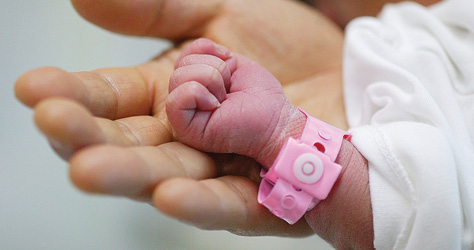If your baby was premature (born before 37 weeks) or needs special care you may need a little more reassurance and support.
We take you through the best advice for coping well and staying strong.
At a glance
- Remember you're not alone up to 10% of babies start their life in special care
- Talk to hospital staff about what you can do
- Skin-to-skin contact has been proved to regulate their breathing and body temperature

Remember you’re not alone
One in 10-15 babies start their lives in special care – and while it isn’t exactly the experience you’d dreamed of for your newborn, take comfort from the fact that they are in exactly the right place to meet their needs.
Those machines and wires
It can come as a shock to parents to see their tiny newborn baby in an incubator hooked up to monitors and tubes, looking so tiny and vulnerable. Try not to be alarmed – they’re there to protect your baby from infection until they get strong enough to cope on their own.
You’re still mum
Lots of mums with special care babies say they feel a bit useless and awkward while medical staff bustle about – almost as if their babies don’t need them. But you can do lots to help: looking after yourself is important – eating healthily and drinking lots of fluids (SCBUs are hot, sweaty places) and getting rest, ready for when you can do more for your baby.
Touch and chat
Talk to staff about what you can do – you may be able to stroke your baby through the incubator portholes. Your baby can already recognise your voice, so talk lots (even if it doesn’t make much sense - either to you or them). You’re probably not going to be feeling at your wittiest.
Feeding
You may not be able to breastfeed yet, but staff will show you how to express milk to get your milk supply going. It can then be given to your little one from a syringe, cup or tube.
Get involved
It’s easy to feel as if the nurses are the experts, not you. Don’t be afraid to ask if you can change your baby’s nappy or help with washing; they’ll be happy to show you how and it will give you confidence for the happy day when you can go home. Keep a diary of your emotions and your baby’s little milestones and take pictures to remind yourself how far you’ve both come.
What’s kangaroo care?
As your baby gets stronger you should be offered this: it’s basically just holding your baby – dressed only in a nappy – on your chest beneath your clothes, just like a baby kangaroo. This skin-to-skin contact has been proved to regulate their breathing and body temperature, improve feeding and help with bonding. Dad can do it too.
Going home
You’ve waited for this day for so long, so how come you feel nervous? Most mums in this position report the same feeling, but the doctors wouldn’t let you go unless they were certain your baby was doing well. Normally, a premature baby is allowed home on or slightly before their due date.